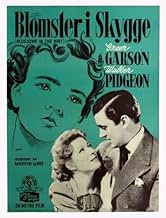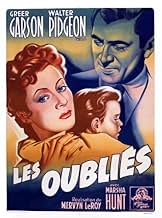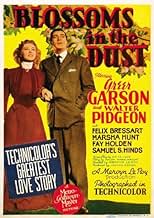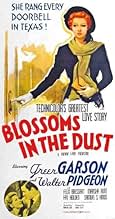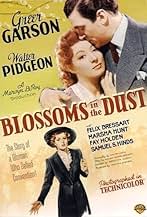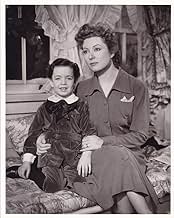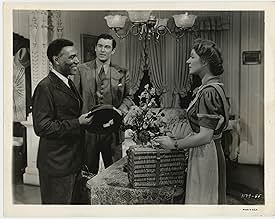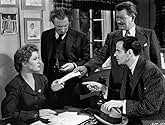PUNTUACIÓN EN IMDb
6,9/10
2,5 mil
TU PUNTUACIÓN
Añade un argumento en tu idiomaAfter losing her young son, Edna Gladney opposes the unfair laws discriminating against children whose parents are unknown, and opens an orphanage for those children.After losing her young son, Edna Gladney opposes the unfair laws discriminating against children whose parents are unknown, and opens an orphanage for those children.After losing her young son, Edna Gladney opposes the unfair laws discriminating against children whose parents are unknown, and opens an orphanage for those children.
- Dirección
- Guión
- Reparto principal
- Ganó 1 premio Óscar
- 3 premios y 4 nominaciones en total
Charles Arnt
- G. Harrington Hedger
- (as Charlie Arnt)
Patricia Barker
- Tony
- (as Pat Barker)
Reseñas destacadas
Edna Gladney was a true inspiration, very ahead of her time and a pioneering figure in the adoption and nursery care field, with a great story worth telling. 'Blossoms in the Dust' is very notable for being the first of eight pairings with Greer Garson and Walter Pidgeon, both fine actors with a legendary partnership at the time. Mervyn LeRoy did do his fair share of great films, especially 'Random Harvest', 'Gold Diggers of 1933' and 'Waterloo Bridge'.
'Blossoms in the Dust' is a beautifully made, beautifully acted and intelligently written film. It is not perfect, but it manages to make the subject accessible, inspiring and worth investing in, at the time where biopic-like films could be too dry and conventional. 'Blossoms in the Dust' also does very well in showing how great a woman in her field Gladney was, while still making her a real person/character and not just an icon. While LeRoy and Pidgeon did even better work than this, Garson's role here for me is one of her best.
It is a shame that the early tragedies weren't dwelled upon enough, near glossed over and too come and go. It is good that the film didn't want to be too serious, but the early tragedies in my mind are crucial to how Gladney came to be the way she became and it would have provided even more depth.
Maybe there could have been fewer characters, figuring out who was who with the children was not always easy.
However, 'Blossoms in the Dust' is a gorgeous looking film, espeically the sumptuous interiors and the Technicolor which is the epitome of first rate. The music is stirring and richly orchestrated, without being excessively melodramatic. LeRoy directs with utmost professionalism and class throughout and never lets things get dull or dry. The acting is very good, while the supporting cast are all dependable with Felix Bressart and dignified Marsha Hunt standouts Pidgeon and especially Garson make more memorable impressions. Pidgeon is a charming presence but this is Garson's film, a nuanced and bold performance that never rings false and wholly successful in making Gladney come over as a real person and not a caricature.
The script is intelligent and sincere, that climactic speech is uplifting and makes one want to stand up and cheer but it is also a tear-jerker. The truly inspirational line "there are no illegitimate children. There are only illegitimate parents" is a line for the ages. The story is always engaging and beautifully told, it has such a warm heart and upbeat quality, while also being very moving without being over-sentimental and compassionately respectful to Gladney, her trials and her achievements. It is not an easy subject to make interesting if one has no prior knowledge about Gladney and her pioneering work, but her story is told accessibly and being someone who has had to overcome a lot it inspired me greatly. It warmed my heart and moved me too, especially later on.
Concluding, very, very good and blossoms in its beauty. 8/10.
'Blossoms in the Dust' is a beautifully made, beautifully acted and intelligently written film. It is not perfect, but it manages to make the subject accessible, inspiring and worth investing in, at the time where biopic-like films could be too dry and conventional. 'Blossoms in the Dust' also does very well in showing how great a woman in her field Gladney was, while still making her a real person/character and not just an icon. While LeRoy and Pidgeon did even better work than this, Garson's role here for me is one of her best.
It is a shame that the early tragedies weren't dwelled upon enough, near glossed over and too come and go. It is good that the film didn't want to be too serious, but the early tragedies in my mind are crucial to how Gladney came to be the way she became and it would have provided even more depth.
Maybe there could have been fewer characters, figuring out who was who with the children was not always easy.
However, 'Blossoms in the Dust' is a gorgeous looking film, espeically the sumptuous interiors and the Technicolor which is the epitome of first rate. The music is stirring and richly orchestrated, without being excessively melodramatic. LeRoy directs with utmost professionalism and class throughout and never lets things get dull or dry. The acting is very good, while the supporting cast are all dependable with Felix Bressart and dignified Marsha Hunt standouts Pidgeon and especially Garson make more memorable impressions. Pidgeon is a charming presence but this is Garson's film, a nuanced and bold performance that never rings false and wholly successful in making Gladney come over as a real person and not a caricature.
The script is intelligent and sincere, that climactic speech is uplifting and makes one want to stand up and cheer but it is also a tear-jerker. The truly inspirational line "there are no illegitimate children. There are only illegitimate parents" is a line for the ages. The story is always engaging and beautifully told, it has such a warm heart and upbeat quality, while also being very moving without being over-sentimental and compassionately respectful to Gladney, her trials and her achievements. It is not an easy subject to make interesting if one has no prior knowledge about Gladney and her pioneering work, but her story is told accessibly and being someone who has had to overcome a lot it inspired me greatly. It warmed my heart and moved me too, especially later on.
Concluding, very, very good and blossoms in its beauty. 8/10.
Much of this movie is fiction, but the fact remains that Edna Gladley was a pioneer in the field of nursery care and adoption and her work to strike the description "illegitimate" from birth certificates as well as insure that these children could inherit from their adoptive parents has changed many lives for the better. Edna was born in Milwaukee; her father died when she was very young; she never had an adopted sister who was herself illegitimate. Because Edna suffered from respiratory disease she was sent to Fort Worth, Texas, when she was seven years old to live with her aunt and uncle. She and her husband Sam were married in Gainseville after which they moved to Wolfe City where they bought a mill to manufacture Gladiola brand flour. They were childless.
Edna began her work in helping impoverished and homeless children soon after moving to Wolfe City where she started a crusade to clean up the county poor farm during which she arranged to have homeless children moved to the Morris Children's Home and Aid Society in Fort Worth. She joined the Society's Board in 1910. She then made trips to settlement houses in Chicago and New York City to study their methods; when she returned she set up a day nursery for working mothers (the movie has her setting up the nursery first when in fact this happened seven or eight years after she became involved in child welfare issues).
As in the movie, Sam's business failed in 1924 whereupon they moved to Fort Worth where Edna continued her work in child welfare. In 1927 she was named superintendent of the Texas Children's Home and Aid Society. Sam died in 1935 after rebuilding his business. Edna spent the rest of her life advocating for children, concentrating on placing homeless and abandoned children with adoptive families. She also expanded the Society to provide health care for unwed mothers and an adoption service for their children. The Society later bought a maternity hospital that it named the Gladney Center.
I loved Greer Garson in this movie, she is strong, brave and gracious. I just wish the director and producers of this movie had used a script that portrayed the real life of Edna Gladney rather than resorting to the fictitious adopted sister who kills herself and inventing a non-existent son who dies in an accident to explain her motives. Edna was her own person who was genuinely involved in her life's work from her early 20s until she died in 1961 -- the movie didn't need these made-up people to explain why she became involved in child welfare issues.
Edna began her work in helping impoverished and homeless children soon after moving to Wolfe City where she started a crusade to clean up the county poor farm during which she arranged to have homeless children moved to the Morris Children's Home and Aid Society in Fort Worth. She joined the Society's Board in 1910. She then made trips to settlement houses in Chicago and New York City to study their methods; when she returned she set up a day nursery for working mothers (the movie has her setting up the nursery first when in fact this happened seven or eight years after she became involved in child welfare issues).
As in the movie, Sam's business failed in 1924 whereupon they moved to Fort Worth where Edna continued her work in child welfare. In 1927 she was named superintendent of the Texas Children's Home and Aid Society. Sam died in 1935 after rebuilding his business. Edna spent the rest of her life advocating for children, concentrating on placing homeless and abandoned children with adoptive families. She also expanded the Society to provide health care for unwed mothers and an adoption service for their children. The Society later bought a maternity hospital that it named the Gladney Center.
I loved Greer Garson in this movie, she is strong, brave and gracious. I just wish the director and producers of this movie had used a script that portrayed the real life of Edna Gladney rather than resorting to the fictitious adopted sister who kills herself and inventing a non-existent son who dies in an accident to explain her motives. Edna was her own person who was genuinely involved in her life's work from her early 20s until she died in 1961 -- the movie didn't need these made-up people to explain why she became involved in child welfare issues.
A good film for a Sunday afternoon, or any other time if you're busy on Sunday.
None of the scenes are dragged out, even the death scenes are treated briefly. Nothing is going to get in the way of the narrative, beginning with a woman overcoming bereavement by taking in the unwanted children an orphans of Texas.
The film then goes on the challenge the very language we use when it comes to these children, with Edna Gladney rejecting the words 'orphan' and 'illegitimate'.
'There are no illegitimate children, only illegitimate parents', she boldly announces to the Texan senate.
And so Gladney's local endeavour becomes a political, state-wide one, and though she never falters in her moral drive, her initial loss is evoked once again in the most cherished of her foundlings.
Fast-paced, fade-outs and an all round good story.
None of the scenes are dragged out, even the death scenes are treated briefly. Nothing is going to get in the way of the narrative, beginning with a woman overcoming bereavement by taking in the unwanted children an orphans of Texas.
The film then goes on the challenge the very language we use when it comes to these children, with Edna Gladney rejecting the words 'orphan' and 'illegitimate'.
'There are no illegitimate children, only illegitimate parents', she boldly announces to the Texan senate.
And so Gladney's local endeavour becomes a political, state-wide one, and though she never falters in her moral drive, her initial loss is evoked once again in the most cherished of her foundlings.
Fast-paced, fade-outs and an all round good story.
"Blossoms in the Dust" is a biographical message movie about the plight of illegitimate children in the early 20th century and the stigma they faced from the get go because of the sins of their parents.
This film might as well have been called "The Greer Garson Show," because it is all about her. She plays Edna Gladney, a woman who made a crusade of finding loving adoptive homes for outcasts. She's lovely and committed in the role, and earned a Best Actress Oscar nomination for it. I believe this was the first time she was paired with Walter Pidgeon, and he's pretty good too as a cocky Texan who charms her and then marries her, but he very definitely stands in Garson's shadow for most of the film.
Cedric Gibbons, Urie McCleary, and Edwin B. Willis won the Oscar for their color art direction, and this is one of the rare films from the early days of Technicolor that looks gorgeous rather than garish. The film was also nominated for Best Picture and Best Color Cinematography.
Grade: B+
This film might as well have been called "The Greer Garson Show," because it is all about her. She plays Edna Gladney, a woman who made a crusade of finding loving adoptive homes for outcasts. She's lovely and committed in the role, and earned a Best Actress Oscar nomination for it. I believe this was the first time she was paired with Walter Pidgeon, and he's pretty good too as a cocky Texan who charms her and then marries her, but he very definitely stands in Garson's shadow for most of the film.
Cedric Gibbons, Urie McCleary, and Edwin B. Willis won the Oscar for their color art direction, and this is one of the rare films from the early days of Technicolor that looks gorgeous rather than garish. The film was also nominated for Best Picture and Best Color Cinematography.
Grade: B+
I found this to be a fast-moving, compassionate (supposedly) true-life story of a woman who helped babies get homes to live in while fighting to have the word "illegitimate" stricken from all record books since it was unfairly penalizing the children.
The three lead actors in the film - Greer Garson, Walter Pigeon and Felix Bressart - are all fun to watch. Garson gives a great speech to Congress near the end of the movie. It's also a nice color film, something that wasn't made much in 1941.
Story-wise, the early tragedies are not dwelled on in here. In fact, they come and go quickly and that's nice because it makes this more of an upbeat movie with a positive message. That's the intent, so why dwell on the negatives?
The only negatives, in my opinion were too much usage of the word "darling," to the point where it's annoying, and the last scene is drawn out a bit too much. But, overall, it's a very powerful movie and guaranteed to bring tears to anyone's eyes. It should appeal to most people. I would like to see this put on a DVD.
The three lead actors in the film - Greer Garson, Walter Pigeon and Felix Bressart - are all fun to watch. Garson gives a great speech to Congress near the end of the movie. It's also a nice color film, something that wasn't made much in 1941.
Story-wise, the early tragedies are not dwelled on in here. In fact, they come and go quickly and that's nice because it makes this more of an upbeat movie with a positive message. That's the intent, so why dwell on the negatives?
The only negatives, in my opinion were too much usage of the word "darling," to the point where it's annoying, and the last scene is drawn out a bit too much. But, overall, it's a very powerful movie and guaranteed to bring tears to anyone's eyes. It should appeal to most people. I would like to see this put on a DVD.
¿Sabías que...?
- CuriosidadesThe child who portrayed Tony in the movie was a 4-year-old named Pat Barker. It was only when Pat came to Fort Worth to celebrate the movie's premiere that the world discovered Pat was really Patricia.
- PifiasSam and Edna celebrated their first anniversary in 1907, which means they married in 1906. But early in the film - when both are still single - they danced to "Let Me Call You Sweetheart", which was not published until 1910.
- Créditos adicionalesOpening credits prologue: This is the story of a great woman, and of the great work she is doing for humanity. Her name is Edna Gladney, and she lives in Fort Worth, Texas. We dedicate this picture to her. Let us first take you back to a certain household in Wisconsin at the beginning of the century -
- ConexionesFeatured in MGM/UA Home Video Laserdisc Sampler (1990)
- Banda sonoraLullaby
(uncredited)
Music and Lyrics by Herbert Stothart and Earl K. Brent
Sung by Nadine Conner and Irene Crane in opening credits
Selecciones populares
Inicia sesión para calificar y añadir a tu lista para recibir recomendaciones personalizadas
- How long is Blossoms in the Dust?Con tecnología de Alexa
Detalles
- Duración
- 1h 39min(99 min)
- Relación de aspecto
- 1.37 : 1
Contribuir a esta página
Sugerir un cambio o añadir el contenido que falta


